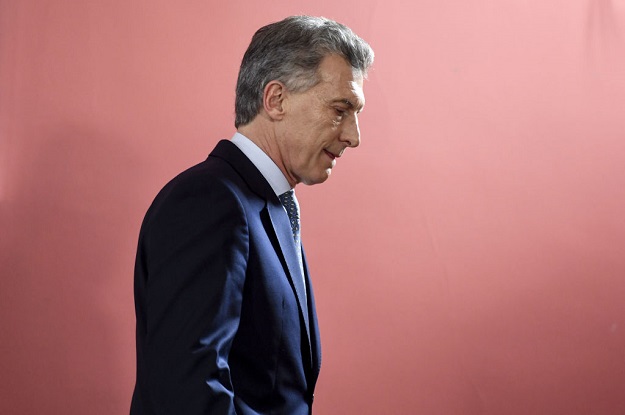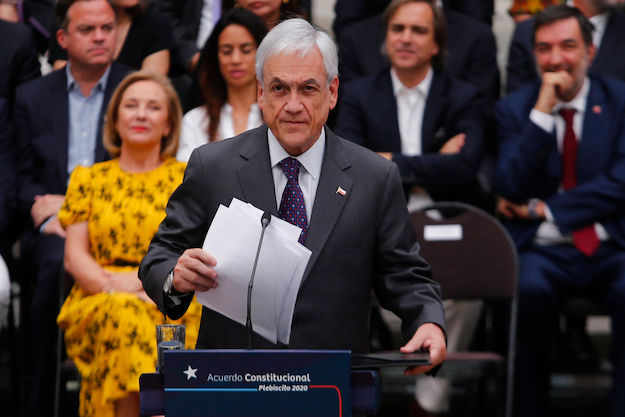This piece has been updated.
Late last week, as Argentina’s peso tumbled yet again and President Mauricio Macri attempted to soothe panicky investors in New York, another high-stakes meeting was taking place in Buenos Aires. Sensing opportunity, four leaders from the moderate wing of the opposition Peronist party gathered to plot a strategy to defeat Macri and gain the Casa Rosada for themselves in October 2019 elections.
It was the clearest sign yet of an emerging “third way” between the center-right, pro-business policies of Macri’s Cambiemos coalition and the leftist wing of Peronism represented by former President Cristina Fernández de Kirchner. Both leaders are under duress: Macri because of the current financial crisis, and Fernández because of the recent “notebooks scandal” which has exposed corruption in her innermost circle and pushed her rejection rate beyond 60 percent.
Recent polls suggest a tight race between Macri and Fernández in a hypothetical runoff next year, while a more moderate Peronist could beat the president. But getting to such a runoff could be difficult. The Macri-Fernández rivalry has dominated Argentine politics for the past decade, and it’s unclear whether there’s breathing room for anybody else. In a June poll from Circuitos, nearly two-thirds of respondents said they felt represented by the Macri and Fernández camps, far ahead of any alternative. When a September survey by Ricardo Ruvier y Asociados asked respondents to pick between Macri and Fernández, only 16.1 percent picked “neither” – up from 10.5 percent in June, but still low. Even the potential challengers voice skepticism. “It’s difficult to break with that binary path,” Sergio Massa, a former mayor of El Tigre and one of the leaders present at last Thursday’s meeting, told La Nación newspaper. “We’re starting from behind … but we’re going to try to do it.”
Massa, who with Salta Governor Juan Manuel Urtubey is considered one of the group’s two most likely presidential candidates, provided a glimpse of the group’s strategy. He dismissed Fernández as “the past,” and spoke of the need for a “plural, inclusive” Peronism – a clear contrast with the ex-president’s notoriously divisive style. On the other hand, Massa slammed Macri’s government for “lying about everything,” “lacking economic direction” and ceding too much power to the International Monetary Fund in last month’s aid deal.
A September poll by Synopsis showed that Massa and Urtubey would beat Macri in a head-to-head matchup by margins of 9.4 and 7.4 percentage points respectively. Their relative strength has heartened some investors who are worried about Macri’s chances at re-election with the recession expected to intensify in coming months, and whose biggest fear is the return of Fernández in 2019. The Massa-Urtubey wing is “relatively pragmatic” and would probably not stray too far from Macri’s economic agenda, said Juan Cruz Díaz, a managing director of the Cefeidas Group advisory firm in Buenos Aires.
The challenge will be settling on a single challenger. The group “knows they should get their act together to have the common role of organizing a competitive opposition,” said Sergio Berensztein, an Argentine analyst and public opinion expert. Massa, 46, has good national name recognition, but came in third place in both the 2015 presidential election and 2017 elections for senator, depriving him of momentum. Urtubey is also a fresh face, aged just 49. But his business-friendly views and cool, conciliatory manner remind some voters of Macri – which may not be an asset in 2019.
Other possible candidates could include Sergio Uñac, a young governor from San Juan, and Miguel Ángel Pichetto, a senator who was at the meeting with Massa and Urtubey. Other experts point to Roberto Lavagna, a former economy minister who helped lead the country out of its 2001-02 economic crisis. Multiple polls indicate that Lavagna is one of the country’s most popular figures, and he has picked up some endorsements from figures including former President Eduardo Duhalde and Ricardo Alfonsín, a former congressmen from within Macri’s coalition and the son of former President Raúl Alfonsín.
Whatever happens over the next year will depend in large part on how Macri’s government tackles rising inflation and unemployment. But not everyone is convinced that Argentina’s economic woes automatically benefit Macri’s rivals.
“There is a reasonable understanding that we will have quite a rough six or nine months ahead. That has clearly hit Macri in terms of society’s positive perception of him,” said Alan Clutterbuck, co-founder and partner of the pollster Poliarquia Consultores. “But no one gains from that decline.”
Lorena Moscovich, a researcher and political science professor at San Andres University in Buenos Aires, agreed. “The president still has good chances of re-election,” she said.
This piece has been updated to include additional comments from Sergio Massa.
—
O’Boyle is a senior editor for AQ









